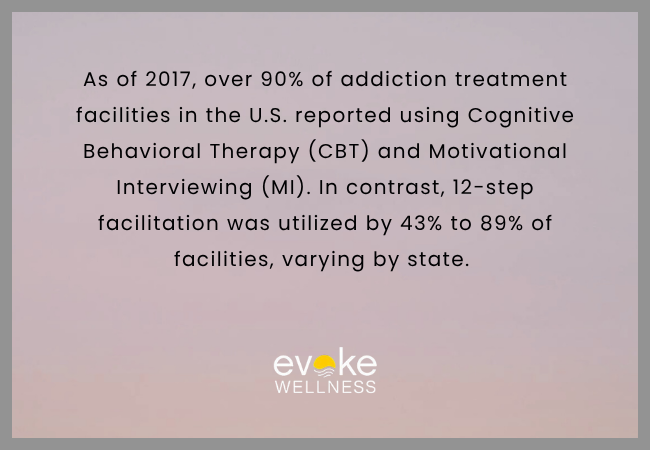For years, the 12-step recovery model has served as a foundation for addiction treatment. While it remains an essential tool for many, clinical advancements in behavioral health now offer diverse evidence-based therapies that support individualized healing. At Evoke Wellness, we believe in blending compassion with science to help clients achieve long-term recovery.
Below, we explore 12 key steps that outline the role of these therapeutic approaches in inpatient rehab, particularly as alternatives or complements to traditional 12-step models.
Step 1: Recognizing the Limits of the 12-Step Model
Traditional 12-step programs, like those founded by Alcoholics Anonymous, offer powerful peer-driven recovery frameworks. However, they often lack the clinical depth necessary for individuals with complex trauma or co-occurring mental health conditions. Not all clients respond to spiritual surrender or peer mentorship. Many need structure, therapeutic intervention, and mental health care to support sustainable recovery.
Step 2: Embracing Evidence-Based Treatment
Evidence-based therapies are grounded in research and clinical effectiveness. These approaches include cognitive, behavioral, and trauma-informed treatments that can be personalized to address specific needs. They provide measurable, trackable progress, allowing clinicians to adapt treatment in real time.
Step 3: Applying Cognitive-Behavioral Therapy (CBT)
CBT is widely used in rehab settings to help patients identify and change self-defeating thoughts and behaviors. Clients learn to recognize the links between thoughts, emotions, and actions. In an Intensive Inpatient Treatment Program in Miramar, Florida, CBT may be conducted daily, empowering patients with practical tools for emotional regulation and relapse prevention.
Step 4: Integrating Dialectical Behavior Therapy (DBT)
Developed to treat individuals with extreme emotional responses or self-harming tendencies, DBT teaches mindfulness, distress tolerance, and interpersonal effectiveness. These skills are especially useful in managing impulsive behavior and emotional triggers in early recovery.
Step 5: Processing Trauma with EMDR
Eye Movement Desensitization and Reprocessing (EMDR) helps patients reprocess painful memories that drive addictive behaviors. By safely confronting trauma in a structured inpatient setting, individuals can reduce the emotional charge of distressing events and begin to heal.
Step 6: Building Motivation Through Motivational Interviewing (MI)
MI is a client-centered technique that helps individuals resolve ambivalence about recovery. It’s especially useful for patients who are not fully committed to treatment or are unsure of their goals. This supportive dialogue encourages intrinsic motivation and often lays the groundwork for deeper therapy work.
Step 7: Creating Structure and Supervision in Inpatient Rehab
Evidence-based therapy is most effective when supported by a structured therapeutic environment. In inpatient settings, therapy is reinforced by routines, medical oversight, and continuous access to clinical staff. This consistency is critical in the first days and weeks of recovery.
Our structured care model also supports step-down services, such as the Partial Hospitalization Program in Miramar, Florida, where clients maintain therapeutic intensity while gaining more independence.
Step 8: Personalizing Treatment Plans
There is no one-size-fits-all recovery model. Upon intake, each client undergoes a thorough biopsychosocial evaluation to determine the right combination of therapies. Individualized plans may include trauma care, medication-assisted treatment, or mental health therapy, depending on clinical assessments.
Step 9: Treating Co-Occurring Disorders
Substance use disorders often overlap with conditions like anxiety, PTSD, or depression. In a Residential Mental Health Treatment in Miramar, Florida, dual-diagnosis care is a priority. Therapies like CBT and EMDR are used in tandem to address both addiction and mental illness simultaneously.
Integrated care models increase treatment efficacy, reduce relapse, and help clients understand how substance use and mental health intersect.
Step 10: Supporting Recovery with Medication-Assisted Treatment (MAT)
When appropriate, MAT combines pharmacological support with behavioral therapy. Medications help ease withdrawal symptoms and cravings, especially for opioid and alcohol dependence. MAT is carefully managed by medical professionals within inpatient rehab, ensuring safety and effectiveness.
Step 11: Encouraging Group Dynamics and Peer Learning
Although this model moves beyond the traditional 12 steps, it doesn’t ignore the power of community. Group therapy remains a core part of inpatient rehab. Patients learn from peers, practice social skills, and build supportive bonds that mirror the accountability found in 12-step meetings.
At Evoke Wellness, group therapy is led by licensed professionals and rooted in evidence-based frameworks, making it both therapeutic and educational.
Step 12: Fostering Long-Term Healing Through Aftercare
Evidence-based rehab doesn’t end at discharge. Aftercare planning is built into every client’s journey. Continued therapy, support groups, and transitional services ensure that progress made in inpatient care carries into daily life.
For many, continuing care includes enrollment in Addiction Programs in Miramar, Florida, where outpatient treatment builds on the foundation of inpatient work. Ongoing support helps clients solidify new coping mechanisms, maintain stability, and reintegrate into their communities.
Why Choose Us?
Choosing the right treatment center is one of the most important decisions someone can make on their path to recovery. At Evoke Wellness, we are more than a facility—we are a team of passionate, experienced professionals who genuinely care about the individuals we serve. Our philosophy is rooted in compassion, respect, and a deep understanding of the complexities of addiction and mental health.
What sets us apart is our commitment to providing care that is not only comprehensive but also deeply personalized. We understand that no two people have the same story, and so we build customized treatment plans that reflect each client’s unique needs, challenges, and goals. This client-centered approach helps our patients feel seen, heard, and understood—critical factors in the healing process.
Our treatment environment is designed to promote stability and safety, essential components during early recovery. Clients benefit from 24/7 clinical supervision, a consistent daily routine, and access to a range of therapeutic services, from individual counseling and trauma therapy to holistic practices that nurture the mind, body, and spirit. We also pride ourselves on having a team that includes licensed therapists, board-certified medical professionals, and peer support staff, many of whom have walked their own recovery journeys. This blend of professional insight and lived experience helps create a truly empathetic, non-judgmental space where healing can begin.
Conclusion
Recovery is a deeply personal journey, and it requires more than one-size-fits-all solutions. While 12-step models continue to offer valuable support for many, they are not a substitute for comprehensive, evidence-based care. The therapeutic interventions available today offer a broader, more effective path to healing—especially for those dealing with trauma, co-occurring mental health conditions, or complex emotional needs.
The journey isn’t always easy, but no one should have to walk it alone. With a dedicated support system, individualized treatment, and a team that genuinely cares, recovery becomes not just possible, but sustainable. If you or someone you love is ready to take the first step toward a healthier future, we’re here to help—every step of the way. Call us today at 866.429.2960 to learn more or to begin the admissions process.
Frequently Asked Questions (FAQs)
What are evidence-based therapies in inpatient rehab?
Evidence-based therapies are clinical treatments backed by research and proven to be effective in treating addiction and co-occurring mental health conditions. These therapies include cognitive-behavioral therapy (CBT), dialectical behavior therapy (DBT), motivational interviewing, and trauma-informed approaches.
How do evidence-based therapies differ from 12-step programs?
12-step programs are peer-based and focus on spiritual growth and personal responsibility. Evidence-based therapies, on the other hand, are delivered by licensed professionals using structured methods supported by scientific research. They can complement 12-step models but offer clinical depth.
Can I still participate in a 12-step program while receiving evidence-based treatment?
Yes, many treatment centers, including Evoke Wellness, integrate both approaches. Clients can attend 12-step meetings while also receiving individual and group therapy rooted in evidence-based practices.
Are evidence-based therapies effective for co-occurring disorders?
Absolutely. One of the strengths of evidence-based therapies is their ability to address not only substance use but also underlying mental health conditions, such as depression, anxiety, PTSD, and personality disorders.
How long does inpatient treatment using evidence-based therapies typically last?
Treatment duration varies based on individual needs, but inpatient programs generally range from 30 to 90 days. Ongoing outpatient care may follow to support long-term recovery.



